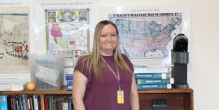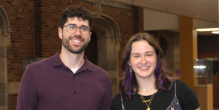Collaborating for a Strong Curriculum
October 12, 2021
Through Professional Learning Communities, faculty are working together to constantly improve the educational experience.
Teachers spend most of the day working alone, the sole adult in a classroom, responsible for making sure that every student masters the material and is ready to move on to the next step of the course. However, it’s in collaborating with their fellow educators that teachers have the chance to learn new strategies and strengthen their skills, while making sure that every student receives the best possible education.
That’s why CDH has implemented Professional Learning Communities, or PLCs, where teachers meet weekly with other members of their department to plan and strategize.
PLC time is built in to our schedule, with each group meeting once a week during Flex. During these meetings, they work on curriculum alignment, common assessments (such as giving the same tests in every Algebra I course, regardless of who teaches it), and work through challenges they are facing in the classroom.
“When we meet, we're working on things for the kids right now,” said Angie Keske, a Social Studies teacher and member of the Instructional Leadership Team who is working with Math teacher Dan Willaert to establish the PLCs. “It's not philosophizing or theorizing. It is valuable work-time to determine ‘What's the skill that we can work on right now for the kids right in front of us?’”
CDH has brought in Mark Onusheck, the Director of Curriculum and Instruction at Stevenson High School in Chicago, to develop the PLC system.
The groups talk about teaching methods for various topics, so that if one educator lands on a great lesson plan, their colleagues can all use it.
“You're getting the best of every teacher in every classroom,” Keske explained. “If I have a really great way to teach writing a thesis, I can share it with my team, and they get to utilize it too. And if they have a really great way of teaching how to analyze a source, I get to use it too.”
Each PLC works on developing shared answers to four critical questions:
- What are students supposed to know, understand, and do? (Standards)
- How will we know when they have learned it? (Evidence)
- What will we do when they haven’t learned in? (Intervention)
- What will we do when they already know it? (Enrichment)
By answering these questions, our faculty can be confident that students are receiving the same high level of education in every class. These answers will also ensure that students move on to the next level ready to succeed, so that a Calculus teacher can be confident that his or her students have mastered the skills from their earlier math courses and are ready to build on them.
“We’re aiming to build a really collaborative culture among our faculty,” Keske said. “We want our students to know that there is a whole team of teachers working together to help them succeed.”
Subscribe to our e-Newsletters
You might also like:
Jenn Androsky Voted Senior Division Teacher of the Year for Minnesota History Day
Social Studies teacher Jenn Androsky, now in her 17th year at CDH, was named the Senior Division Teacher of the Year for Minnesota History Day.
President Myers: Students Are the Mission
Greta Cunningham '23 sat down with President Jeb Myers for a Q&A session, focusing on questions from a student's perspective.
New Faces Bring New Energy to CDH Music
It’s an exciting time for music at Cretin-Derham Hall as CDH welcomes new band director Teddy Williams. Williams will join choir director Delilah Schuster, who started at CDH last year, in continuing to grow music education for students.




